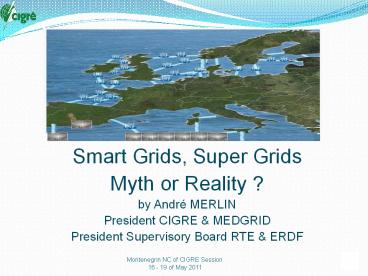Smart Grids, Super Grids - PowerPoint PPT Presentation
Title:
Smart Grids, Super Grids
Description:
Smart Grids, Super Grids Myth or Reality ? by Andr MERLIN President CIGRE & MEDGRID President Supervisory Board RTE & ERDF * Montenegrin NC of CIGRE Session – PowerPoint PPT presentation
Number of Views:238
Avg rating:3.0/5.0
Title: Smart Grids, Super Grids
1
- Smart Grids, Super Grids
- Myth or Reality ?
- by André MERLIN
- President CIGRE MEDGRID
- President Supervisory Board RTE ERDF
1
2
Contents
- New requirements of power systems within the
European Energy Policy - Smart Grids and Super Grids stakes and
applications in transmission and distribution
systems
2
3
Electricity will play a more and more important
role to meet the three main objectives of the
European Energy Policy
- To increase the security of supply
- To reduce CO2 emissions
- To control energy costs.
3
4
- On the demand side, electricity provides high
level energy efficiency - On the supply side, it provides for the
development of low carbon energy sources (from
nuclear, hydraulic, wind, solar, geothermal).
4
5
Electricity production in the EU Member States
in 2005
TWh
940 139 694 40 998 341 157
28,4 4,2 21,0 1,2 30,2 10,4
4,8
Coal Oil Gas Others
54,6
Nuclear Hydro Renewables
45,4
Total
3309
5
6
Power generation for EU-27 by 2020
- 2/3 of the production from low carbon sources
- 1/3 nuclear
- 1/3 renewable sources (including hydraulic)
- of which 13 wind energy (1.9 in 2005).
6
7
13 wind energy in the electricity mix in 2020
implies a production of 500 TWh out of a total
of 4 000 TWh
- In order to produce such a quantity, 200 to 250
GW wind farms out of a total of 1000 GW power
plants, must be installed and connected to the
European power system.
7
8
Looking ahead to 2050
- When CO2 capture and sequestration (CCS)
technology is industrially available, it will be
possible to design a European power system with
nearly no CO2 emissions.
8
9
- SUCH A RADICAL CHANGE IN THE MIX OF POWER
GENERATION WILL REQUIRE A GREAT EVOLUTION OF THE
GRIDS.
9
10
Why such a change ?
- To allow for the large integration of
intermittent renewable energies - To increase the security of supply by mutual back
up between the power systems of the Member States
of the EU and with the neighbouring
interconnected regions - To reach a wider integration of the electricity
markets.
10
11
What does this mean for the future of the grids ?
- Stonger interconnections within the European
system - An extension of these interconnections beyond the
present limits (to the South around and across
the Mediterranean Sea and with the Russian
electricity system UPS/IPS) - A more efficient operation of the electricity
systems and particularly the distribution
networks to face the growing complexity of
systems management.
11
12
Two major strategies for future electricity
systems
- More powerful networks (Super Grids)
- More intelligent networks (Smart Grids)
12
13
Super Grids 4 priorities for the development of
the electricity transmission system of the EU
- An interconnection plan for Baltic networks with
the European electricity network - A Euro-mediterrannean interconnection plan
(MEDGRID) - A Centre - South - East Europe interconnection
plan - An interconnection plan for an offshore submarine
network in the Baltic and North Sea. - Second EU strategic energy review by the
European Commission (November 2008)
13
14
Medgrid, an industrial initiative for electricity
exchange in the mediterranean basin
14
15
15
Medgrid Partners
16
Submarine grid for the North Sea and the Baltic
Sea
By 2020, connect 25 GW of wind farms and
hydraulic plants to the National AC systems in a
first phase and benefit from trading
opportunities.
16
17
Smart GridsTransmission networks 2 major
achievements
17
18
Regional study centre for coordinated operation
of the system, Coreso is a partnership of RTE,
Elia, National Grid, Terna and 50Herz which aims
to evaluate the safety of the Western system, to
inform and to alert the National dispatchings.
18
19
CECRE (Red Electrica) First control room for
renewable energies
- Provides for maximum integration of renewable
sources within the electricity system in the
safest conditions.
19
20
Smart Grids Distribution Networks
- The opening of electricity markets has led to
the development of the smart meter which is the
cornerstone of Smart Grids in the distribution
network. - The European Commission targets 80 of smart
meters in 2020. - The network is changing from passive to active
through the development of decentralized power
generation from wind or solar installations and
its structure and operation must be quickly
adapted.
() Art. 3, annexe 1 of the internal electricity
market Directive of the13 July 2009
20
21
- The communicating meter the lever of
modernisation for the management of ERDF
distribution networks - Improve the knowledge of the network by having
data more precise and updated real time - Better charge of the customers consumption
- Allow demand side management toreduce energy
consumption
21
22
Plan chosen by ERDF
Substation "Concentrator "
Linky
Central Information System
Automation
GPRS MV network
PLC Local LV network
Customers
Suppliers
22





























![[PDF] DOWNLOAD Ultimate Word Search Challenge: Hard Wordsearches for E PowerPoint PPT Presentation](https://s3.amazonaws.com/images.powershow.com/10103847.th0.jpg?_=20240821032)

